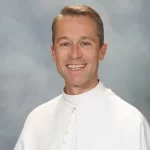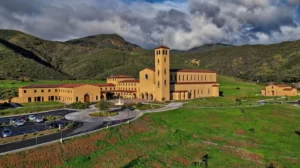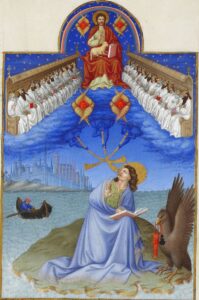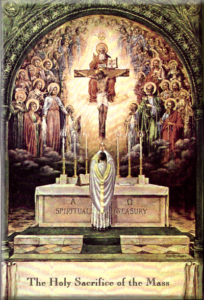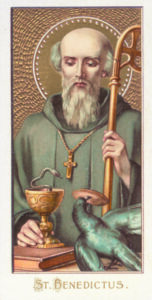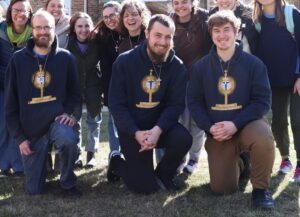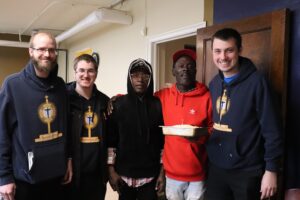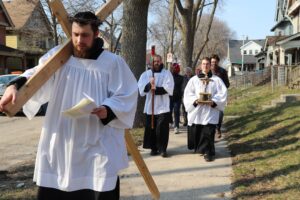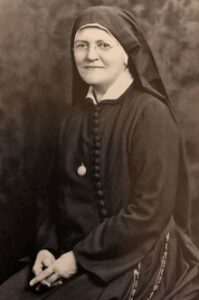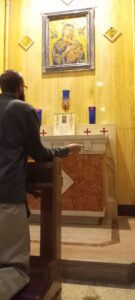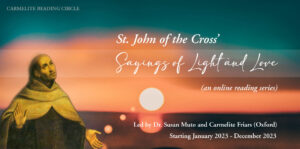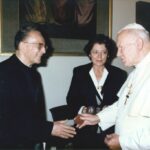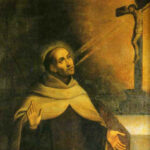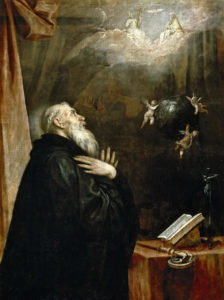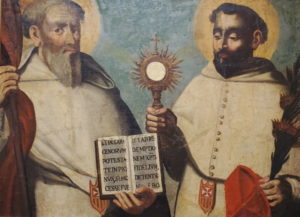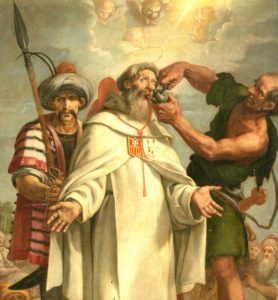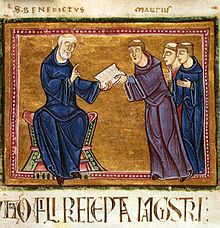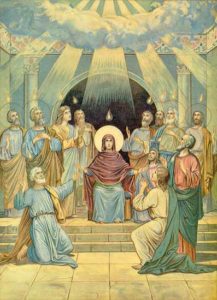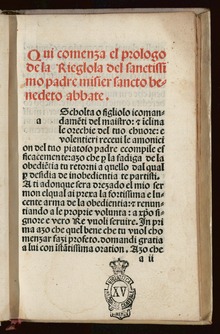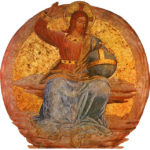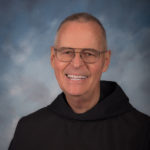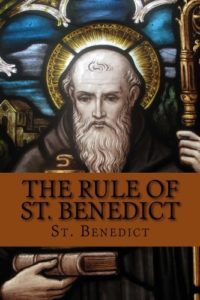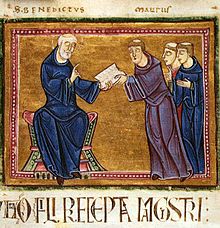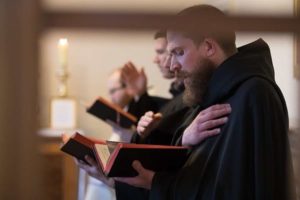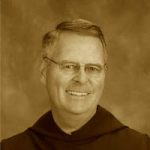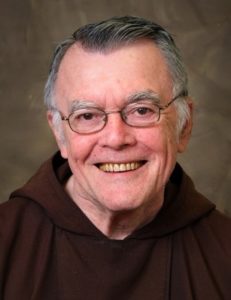 Fr. Regis Scanlan, OFM Cap., was a close friend of Servant of God Fr. John A. Hardon, SJ., founder of the IRL. In fact, when Mother Teresa asked Father Hardon for a priest who could give her sisters intensive Eucharistic Formation, he said that Father Regis was the obvious choice.
Fr. Regis Scanlan, OFM Cap., was a close friend of Servant of God Fr. John A. Hardon, SJ., founder of the IRL. In fact, when Mother Teresa asked Father Hardon for a priest who could give her sisters intensive Eucharistic Formation, he said that Father Regis was the obvious choice.
Below is the press release that announced Father Scanlon’s death. It really was a remarkable life!
NEWS RELEASE
from Capuchin Province of Mid-America
Communications Office, 3613 Wyandot St., Denver 80211
Fr. Blaine Burkey, O.F.M.Cap., 303-204-1924
Fr. Regis Paul Scanlon, O.F.M.Cap., 78, internationally-known defender of the Catholic faith and locally-loved defender of the poor and marginalized, died at Porter Adventist Hospice, Centennial, Colo., on Nov. 6.
Death came for Fr. Regis only after a long procession of life-threatening illnesses begun already at age 17.
Born the son of the late Jerome Francis and Dorothy Mary (Meyer) Scanlon in Pittsburgh on Feb. 17, 1943, Regis Scanlon attended Pittsburgh’s St. Athanasius Grade School and North Catholic High School before graduating from North Hills High School in 1961. He began studies at Pennsylvania state colleges in Slippery Rock and Mansfield for becoming a math teacher, but decided to study for the priesthood instead.
After taking Latin and Greek courses at Loyola University, Chicago, and Duquesne University, Pittsburgh, he entered St. Fidelis College Seminary, run by the Capuchins at Herman Pa. in 1965, graduating in 1969 with a BA in philosophy. He then earned an MA in systematic theology from the Washington (D.C.) Theological Union in 1974.
Meanwhile he made a year’s novitiate as a Capuchin Franciscan at Annapolis, Md. He took first vows in the Order in 1967, and permanent vows in 1970, and was ordained to the priesthood at Herman on Aug. 26, 1972.
For the next six years, Father served as associate pastor at Capuchin parishes in Hays, Kans.; Thornton, Colo.; Dover, Ohio; Herman, Pa.; Victoria and Walker, Kan.
He took mathematics and education courses at Fort Hays (Kan.) State University, and spent the next decade at Thomas More Prep-Marian High School in Hays, teaching math courses and serving as associate dean of resident students.
Father then moved to St. Louis and served for a year as associate chaplain at the Newman Chapel at Washington University; after which she served for six years as chaplain of the Catholic Campus Center at Auraria Higher Education Center in Denver. During these years he was also an instructor in the archdiocesan diaconate program and adjunct professor at St. Thomas Seminary.
He appeared several times with Mother Angelica on EWTN in the late 1980s, and became widely known as a defender of the faith, contributing frequently to Homiletics and Pastoral Review, Pastoral Life, The Priest, Soul Magazine, The Catholic Faith, New Oxford Review, Catholic Insight, Crisis Magazine, and his own blog at frregisscanlon.com Thinking that many had gone astray by misreading the council documents, he produced a series of videos for EWTN on What Vatican II Really Taught. Many people disagreed with his strong views, but the vast majority found him to be a respectful and friendly adversary; and he was regularly the center of much good-natured fun in the community.
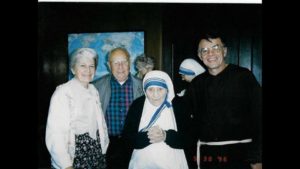 In 1990 Father began working with St. Teresa of Calcutta’s Missionaries of Charity, serving as chaplain at Seton House AIDs hospice and later at their Gift of Mary shelter for homeless women. Mother Teresa personally recruited him to help in the formation of her sisters, and he spent much of the last years of the second millennium conducting retreats for her sisters gathered in South Africa, Madagascar and Tijuana. Father was also for many years the official confessor of the Carmelite nuns in Littleton and the Benedictine nuns in Boulder.
In 1990 Father began working with St. Teresa of Calcutta’s Missionaries of Charity, serving as chaplain at Seton House AIDs hospice and later at their Gift of Mary shelter for homeless women. Mother Teresa personally recruited him to help in the formation of her sisters, and he spent much of the last years of the second millennium conducting retreats for her sisters gathered in South Africa, Madagascar and Tijuana. Father was also for many years the official confessor of the Carmelite nuns in Littleton and the Benedictine nuns in Boulder.
Fr. Regis served as archdiocesan director of prison ministry from 1998 till 2010. He first concentrated on obtaining and training co-workers, and eventually, assisted by six deacons and three priests, and 70 trained lay volunteers, he directed the Church’s ministry to more than 9,500 inmates of 17 prisons and jails in the Denver area. About 850 prisoners were attending Catholic services weekly. After his years as director, he continued to visit some of the jails regularly.
The crown of Fr. Regis’s life’s work was his founding of the Julia Greeley Home in Metro Denver. While working in the jails, Father learned how dangerous it is for single, unattached, homeless women to live on the streets, and he worked hard to start a program to help them rebuild their lives into the dignity of productive and independent living. Now in its eighth year, Julia Greeley Home (juliagreeleyhome.org) has already served more than 75 women, over half of whom have gone on to rebuild their lives by finding meaningful work, independence housing, and reconciliation with their families.
Besides his religious brothers in the Capuchin Province of St. Conrad, Fr. Regis is survived by a brother Jerome Francis Scanlon (and wife Connie) of The Villages, Fla.; a nephew Jerry Michael Scanlon (and wife Jane) of Mt. Airy, Md.; a niece Jacqueline Derosiers (and husband Rene) of Mt. Pleasant, S.Car.; and grandniece Lauren Derosiers of Mt. Pleasant.
Funeral services will be at St. Jude’s Catholic Church, 9405 W. Florida Ave., Lakewood, with viewing beginning at 6 p.m. on Sunday Nov. 14, followed by a vigil service at 7 p.m. The funeral Mass will be on Monday, Nov. 15th at 10 a.m., followed by interment in the Friars Plot at Mt. Olivet Cemetery, Wheat Ridge.
Memorials are suggested to Julia Greeley Home Inc., and the Capuchin Province of St. Conrad, Inc.
Like this:
Like Loading...
 Located southwest of Dubuque in Peosta, Iowa, New Melleray Abbey was founded in 1849 by Cistercian monks of their Order from Mount Melleray Abbey in Ireland. The Cistercians of the Strict Observance (Trappists) treasure the balance Saint Benedict provides in his Rule between communal prayer and private prayer. From pre-dawn to night fall, the brothers, in union with the whole Church, gather seven times each day to sing Psalms together in praise of God. They also gather each day to hear the Word of God and for the breaking of the bread in the celebration of the Mass.
Located southwest of Dubuque in Peosta, Iowa, New Melleray Abbey was founded in 1849 by Cistercian monks of their Order from Mount Melleray Abbey in Ireland. The Cistercians of the Strict Observance (Trappists) treasure the balance Saint Benedict provides in his Rule between communal prayer and private prayer. From pre-dawn to night fall, the brothers, in union with the whole Church, gather seven times each day to sing Psalms together in praise of God. They also gather each day to hear the Word of God and for the breaking of the bread in the celebration of the Mass.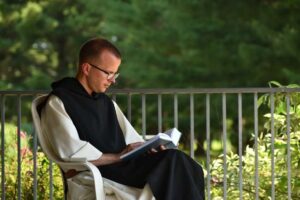 Through their guest house and other forms of monastic hospitality, they offer to their brothers and sisters a place where they may find acceptance, peace, and prayer. With Trappist Caskets they support themselves and supply employment to local men and women by making and selling simple wooden caskets and burial urns of exceptional quality. They also provide free caskets for children’s funerals as a work of mercy. (NewMelleray.org)
Through their guest house and other forms of monastic hospitality, they offer to their brothers and sisters a place where they may find acceptance, peace, and prayer. With Trappist Caskets they support themselves and supply employment to local men and women by making and selling simple wooden caskets and burial urns of exceptional quality. They also provide free caskets for children’s funerals as a work of mercy. (NewMelleray.org)